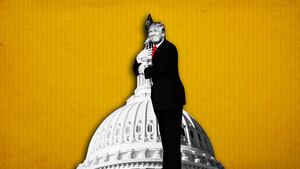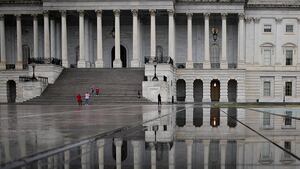Airport security screeners forced to work without pay during the government shutdown have been calling out sick. But now the mad-as-hell workers are actually quitting their jobs.
That’s according to union officials representing Transportation Security Administration officers, who will miss their first paycheck since the government ground to a halt Dec. 22 over a budget and border wall impasse.
“Some of them have already quit and many are considering quitting the federal workforce because of this shutdown,” Hydrick Thomas, head of the American Federation of Government Employees' TSA Council, said in a statement Tuesday.
“The loss of officers, while we're already shorthanded, will create a massive security risk for American travelers since we don't have enough trainees in the pipeline or the ability to process new hires. Our TSOs already do an amazing job without the proper staffing levels, but if this keeps up there are problems that will arise—least of which would be increased wait times for travelers.”
Because the security officers are considered essential employees, they have to work regardless of whether they get paid. Some have called out sick, whether in protest or to work another job.
One TSA worker at JFK International Airport in New York told The Daily Beast that at least 15 of his coworkers have called out since the shutdown began on Dec. 22—and he might be next.
“Listen, I love my job and I have been willing to work for free as people in Washington sort everything out,” said the worker, who has been on the job for about a year and asked to remain anonymous.
“But how long is this going to take? I have a newborn,” he said. “I can barely afford to miss this pay period. I don’t want to lose my job but I also don’t want to lose my apartment, you know?”
The sick-out was blamed for nightmarish lines at some airports last weekend. Administration officials downplayed the impact, with Homeland Security spokesman Tyler Houlton tweeting that reports of absent workers were “fake news”—earning praise from President Trump.
But two groups representing the aviation industry say the threat to safety and sanity from the shutdown is all too real. A pilots’ union and an organization representing hundreds of airports called on Washington this week to get the government back to work.
“The significant reduction in federal operations under the shutdown is already causing numerous problems at our nation’s airports,” Airports Council International-North America wrote in a letter Tuesday to President Trump and congressional leaders.
The group, the lobby arm of commercial airports across the country, cited longer wait times at Transportation Security Administration checkpoints and Customs and Border Protection ports of entry, and overburdened Federal Aviation Administration employees.
“Both passengers and cargo are likely to face increased processing times during the shutdown due to staffing shortages,” the letter said, adding that FAA furloughs mean “no one will be there to develop and approve enhanced flight procedures, install and maintain navigational aids and air-traffic control support systems, coordinate the review of applications for new or expanded airport facilities, or hire and train new air traffic controllers.”
And the Air Line Pilots Association International said in a letter to Trump that the shutdown is “adversely affecting the safety, security and efficiency of our national airspace system.” The union said fewer inspections because of the staffing crunch will “potentially allow for the introduction of safety issues that put passengers and airline crews at risk.”
An increase in recreational drones with fewer workers to crack down on them could cause problems and delays, the association said. And the shutdown has also snarled implementation of a new communications system and may force substantial retraining.
Long lines at some major airports over the weekend had dissipated by the start of the work week. Wait times appeared to be about average at JFK and LaGuardia in New York and Ronald Reagan Washington National Airport on Monday and Tuesday.
But passengers still girded for chaos, adding a new element of uncertainty and anxiety to their travels.
Stanley Anderson, 52, heading for LaGuardia’s Terminal B security checkpoint on Tuesday, said the short lines are just the “calm before the storm.”
“This problem can’t get better under the shutdown, right? So while everything may be working smoothly this morning, it’s only a matter of time before disaster strikes,” Anderson, an insurance agent traveling to Cincinnati, Ohio, told The Daily Beast.
“All I can say if I don’t want to be traveling when it happens.”
Another passenger got to JFK for a flight six hours early.
“My daughter missed her flight over the weekend because of a long security line and I refused to be screwed over because politicians can’t get their act together to pay TSA agents and end this shutdown,” said the traveler, a 65-year-old man who said his name was Brian.
“People in Washington don’t realize that their actions affect others. People at this airport are not getting paid to do their job, which leaves people like me having to spend their vacation waiting around the airport,” he said.
Paul Hudson, president of Flyers Rights, a passengers’ rights organization, who said that while delays from the shutdown “have been isolated to negligible” so far, the problems will only get worse if the shutdown continues past Friday’s payday—at which point some workers may have to call out sick or quit to take other jobs.
And, Hudson added, “when weather events or computer outages occur the DOT aviation consumer protection, investigation, and enforcement offices are on furlough and not reporting to work.
“So there is no real current real-time enforcement going on.”
With the government shutdown dragging into its third week, and no immediate end in sight, overworked TSA agents were finding it difficult to be motivated.
Asked how she feels about the shutdown, one TSA agent at Reagan smiled and flashed a side-eye glance. “That’s my answer.”
“How would you feel if you had to work and you didn’t know when you were going to get paid?” she added.
“I’m not optimistic,” a male TSA agent at Reagan added. “Just get something done. I’m here regardless, either way. There’s a lot of people riding on it.”
A LaGuardia TSA agent said the problem isn’t that the existing agents are being overworked; it’s that they don’t have enough bodies in the event of an emergency.
“We are trained to handle working multiple jobs if we are understaffed, but what if there is another major holiday or a storm that knocks out flights? We are unprepared for any situation other than a normal work day,” said the agent, a mother of two.
The TSA has insisted no one is at risk.
“Security effectiveness will not be compromised and performance standards will not change,” the agency tweeted on Friday. “Wait times may be affected depending on the number of call outs.”
“We understand that the current lapse in funding may be causing added stress for our workforce and want to continue to express that we are grateful to the more than 51,000 officers across the country who remain focused on the mission,” Michael Bilello, the agency’s spokesperson, added on Tuesday.
The Federal Aviation Administration told CBS on Monday that security inspectors at some airports are being called back to work on a “case-by-case basis.”
“We’re going to continue to prioritize with the resources that we have,” FAA spokesman Gregory Martin. “Our focus is on the commercial air carriers and volumes of people they carry.”
Union officials with the AFGE have not said how many TSA workers have called out sick or quit—but it’s pushing for its members to get paid to stay on the job.
“TSA Officers already have the least amount of rights of any federal officer, some of the lowest pay and highest attrition rates in government, and among the lowest morale of any federal agency. Working for weeks on end without being compensated—while already being short-staffed—only makes their situation worse,” union president J. David Cox Sr., said in a statement.
"It's very disheartening when I get calls from workers who are afraid they can't pay their bills or rent, and it kills me to tell them there may not be an end in sight. These public servants joined the federal workforce so they could serve their country, and they do an admirable job.”
The Daily Beast contacted the TSA for comment for this story and received in return an email from spokesperson Lisa Fabstein that explained that due to the “lapse in federal funding,” she will not respond to inquiries “until after budget appropriations are enacted.”











